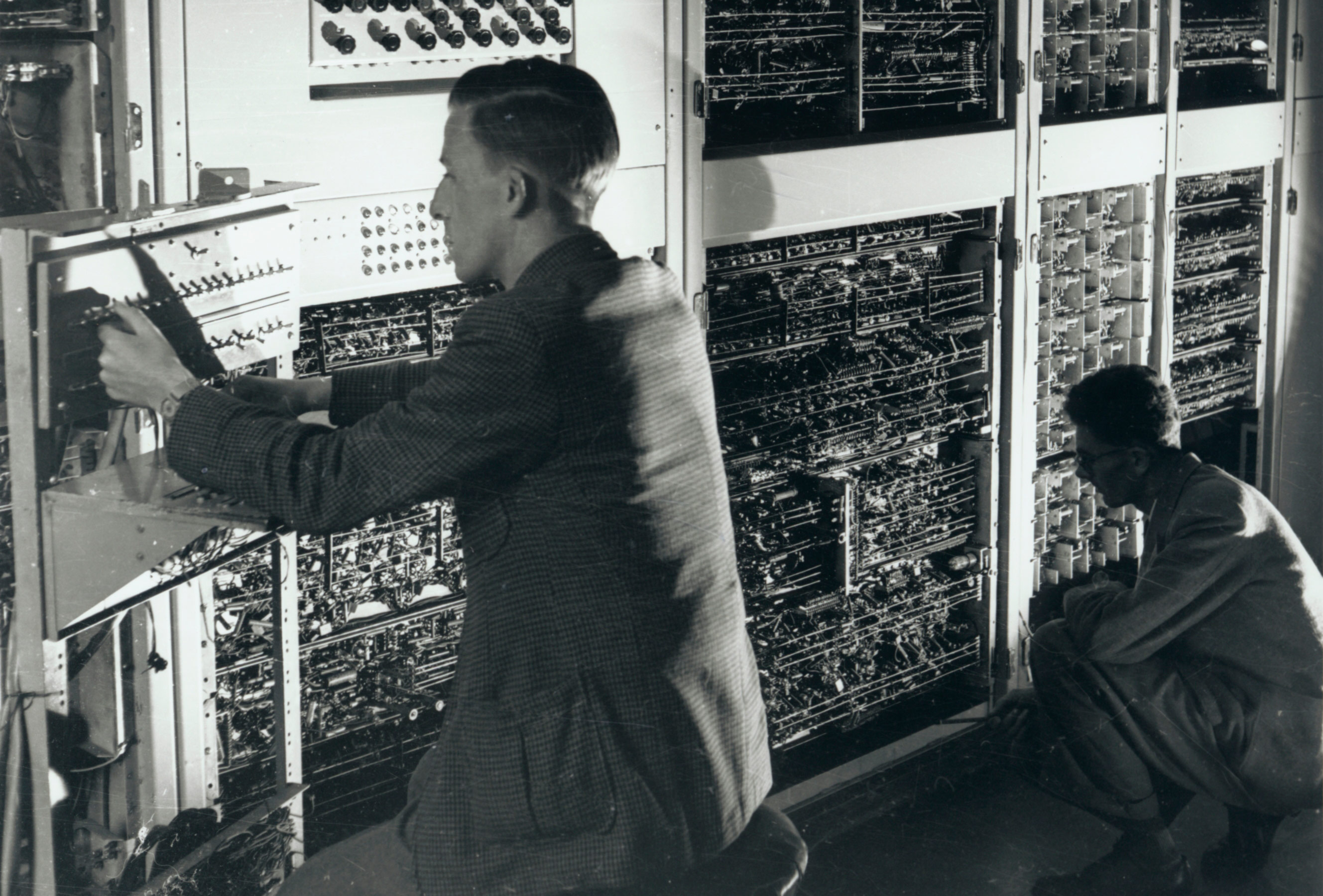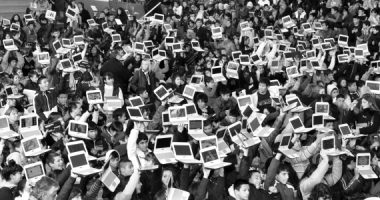
Computer CSIR Mk 1 ran its first test program in 1949 | Archives, CSIRO | CC BY 3.0
Today nearly half of the world population is online. Relevant issues such as equality, diversity, freedom, literacy and neutrality also define the in-depth debate on the Internet. What can we do, from within culture, towards an Internet that is freer, more equitable and more open. The third edition of the Cultural Innovation International Prize aims to recognise innovative projects on the present and future of the Internet that help to empower citizens and improve the network.
Every new edition of the Cultural Innovation International Prize proposes a different theme. In the first edition the theme was “Audience/s”, confirming that the concept, ways, and tools available for accessing cultural contents are changing radically in the 21st century, despite the fact that some traditional forms of prescribing remain intact. The second edition was devoted to “Climate change” and formed part of an extensive CCCB programme (2016-2018) revolving around everything that culture can contribute to help attenuate the consequences of the serious environmental crisis that we are suffering. Fort the third edition of the Prize, the theme chosen is Internet.
In 2019, it will be 50 years since Arpanet, the network considered to be the origin of the Internet, was launched. And it will also be the 30th birthday of the WWW, coinciding with a time in which its very creators admit that there are threats hovering over this set of interconnected technologies. Although they have enabled evident advances in access to information, creativity and education, at the same time they could become a powerful tool for the oppression, censorship and mass control of citizens.
Oh, Internet, Internet!
The Internet is a mirror of our evolution (or involution) as a species. A set of disruptive technologies that have changed and will continue changing our way of constructing worlds.
The network has gradually been rolled out as a giant, baroque and labyrinthine organism with growth phases governed by exponential laws under the designs of enigmatic algorithms. It has had its periods of expansion and also its collapses; like other processes of technological evolution, there have been mass extinctions and new rebirths. Some of the original species have disappeared, but every day new species are incorporated into a universe undergoing constant expansion.
Much has occurred in recent years, with the introduction of the Internet into all areas of the social sphere, from the military to the scientific, from the academic to the domestic. Currently nearly half of the world population is now online. The Internet is the reflection of the society in which we live: all our differences, problems and uncertainties are accentuated and multiplied online. Relevant questions such as equality, diversity, freedom, literacy and neutrality also define the in-depth debate about the Internet.
In 2009, Tim Berners-Lee, inventor of the WWW, founded the WWW Foundation with the aim of defending an open Internet understood as a public property and a basic right, and collaborating in the fight for digital equality. Since then, it has continued to watch and denounce the consequences of the improper use of his invention. And there are already various critical voices in this respect: in 2016, mathematician Cathy O’Neil published Weapons of Math Destruction, a text about the implications of the indiscriminate use of algorithms in decision-making, and in 2018, Virginia Eubanks, associate professor of political science at the University at Albany (New York), has published Automating Inequality: How High-Tech Tools Profile, Police, and Punish the Poor, in which she denounced, precisely, the fact that the use of applied algorithms together with demographic statistics, far from helping to create an equitable system, continues to propagate a partial and prejudice-filled view of society.
Along the same line of research, the Mozilla Foundation this year published its Internet Health Report which, through the analysis of different aspects of the Internet (digital literacy, decentralisation, inclusion, privacy and security) puts emphasis on factors of inequality and risk, among which it is necessary to highlight the following points:
- Despite the fact that practically 50% of the world population is online, connection to the Internet is not equal: whereas in Europe, 80% of the population has Internet access, in Africa the proportion falls to 20%.
- Although connection to the Internet is a fundamental right for economic development, global connectivity rates have barely increased by 5% in recent years.
- The digital divide is a reflection of social inequality and this is made clear by the fact that in those countries where women have less access to education and to labour and economic rights, they also have less access to the Internet.
- Having access is no guarantee of greater information freedom, as shown by the fact that two thirds of users around the world live in countries where censorship is common.
- Today the Internet is controlled by multinationals that are monopolizing the Internet and the information circulating around it, jeopardising its supposed decentralisation and neutrality.
- Technology companies are composed in their majority of low-diversity profiles, mainly white males, which means that software and algorithms that they develop are a reflection of their own creators, leaving aside the needs of other users and communities with less representation.
- A quarter of the people online are aged between 15 and 24 and in Europe 96% of young people are connected, but this percentage is independent of the education of users or of their digital literacy level, which directly affects the level of efficiency with which they use it.
- Recent studies show that having access to the Internet and the use of apps does not always produce positive emotions and some research studies have started to analyse the negative impact and unhappiness caused by certain mobile apps.
The future (is) Internet
The Internet of Things (IoT), Big Data, advances in virtual reality, the emergence of quantum computing, the role of algorithms and the development of artificial intelligence (AI) are decisive for discerning the future of the Internet. It is futile to reject a technology that already forms part of our everyday life, but what is essential is a broad debate on how we currently use it and how we expect it to be in the future.
Let’s think, for example, about electrical household appliances connected to the Internet. At the start of this year, journalist Kashmir Hill published on Gizmodo the results of her household experiment after installing all the devices possible that are IoT-enabled. From a mattress that analysed her sleep to a sex toy, and including her toothbrush. Meanwhile Surya Mattu, her IT-specialist colleague, monitored the data traffic generated by all these objects through a router: each appliance issued reports on her activities, data and more data, video recordings, records of use, timetables of her domestic routines, and all of this was sent with different levels of coding to the respective companies.
Another example is The Little Book of Design Fiction for Internet of Things, a publication by Paul Coulton, of the Chair of Speculative and Game Design at Lancaster University, with the collaboration of Rachel Cooper and Joseph Lindley. This is based on a research study carried out as part of their collaboration with PETRAS, a consortium formed by nine universities in the United Kingdom with the aim of exploring critical aspects related with privacy, ethics, trust, acceptability and security related with AI and IOT. In this publication, one of the imaginary objects that they propose (with humour and irony) is a kettle capable of detecting, among other things, whether a friend of yours is relatively close to your home and perhaps you should invite him round for a cup of tea… Coulton’s line of research through speculative design leads him to analyse and propose in a critical and imaginative way the possibilities offered by IoT technology. His department has also participated in The Living Room of the Future, an immersive installation with the collaboration of BBC-RD, Lancaster University and Nottingham University.
And what are we to think about projects such as Disobedient Wearables? Based on the idea of wearables such as smart watches or wristbands which capture our movements and routines, it speculates with the idea of Civic Armor, a t-shirt capable of recording and detecting the impacts received during police charges at demonstrations to act as evidence, produce maps and become a tool for denouncing abuses of power.
These are just some of the diverse examples that show that beyond pessimistic or dystopian visions, there also exists the conviction that the better we know the potentials and risks of the Internet and technologies that accelerate and expand it, the better we will be able to use them to create a more critical, creative and democratic world. It is no easy task. It requires permanent research and innovation. No individual mind is capable of understanding all the implications of a technology that is visible and invisible all at the same time. A massive amount of work is required and the cultural world has a relevant role to play.
In this sense, the third edition of the Cultural Innovation International Prize joins the numerous initiatives that from different disciplines, organisations and geographical spheres, trust in another Internet being necessary and possible.




Leave a comment